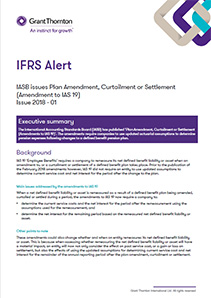The International Accounting Standards Board (IASB) has published ‘Plan Amendment, Curtailment or Settlement (Amendments to IAS 19)’. The amendments require companies to use updated actuarial assumptions to determine pension expenses following changes to a defined benefit pension plan.
Background
IAS 19 ‘Employee Benefits’ requires a company to remeasure its net defined benefit liability or asset when an amendment to, or a curtailment or settlement of a defined benefit plan takes place. Prior to the publication of the February 2018 amendments however, IAS 19 did not require an entity to use updated assumptions to determine current service cost and net interest for the period after the change to the plan.
Executive summary
The International Accounting Standards Board (IASB) has published ‘Plan Amendment, Curtailment or Settlement (Amendments to IAS 19)’. The amendments require companies to use updated actuarial assumptions to determine pension expenses following changes to a defined benefit pension plan.
Main issues addressed by the amendments to IAS 19
When a net defined benefit liability or asset is remeasured as a result of a defined benefit plan being amended, curtailed or settled during a period, the amendments to IAS 19 now require a company to:
- determine the current service costs and the net interest for the period after the remeasurement using the assumptions used for the remeasurement; and
- determine the net interest for the remaining period based on the remeasured net defined benefit liability or asset.
Other points to note
These amendments could also change whether and when an entity remeasures its net defined benefit liability or asset.
This is because when assessing whether remeasuring the net defined benefit liability or asset will have a material impact, an entity will now not only consider the effect on past service cost, or a gain or loss on settlement, but also the effects of using the updated assumptions for determining current service cost and net interest for the remainder of the annual reporting period after the plan amendment, curtailment or settlement.
Effective date
These amendments are effective for annual reporting periods beginning on or after 1 January 2019, with early application permitted.
Transition
The amendments are only to be applied prospectively as the IASB concluded that the benefits of applying the amendments retrospectively would not exceed the cost of doing so.
Their reasoning was that entities might need to revisit plan amendments, curtailments and settlements that occurred several years previously and remeasure the net defined benefit liability or asset as of those dates. The IASB also concluded that requiring a retrospective application would not provide useful trend information.


